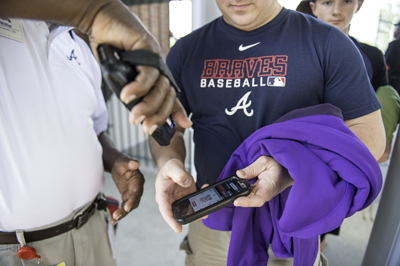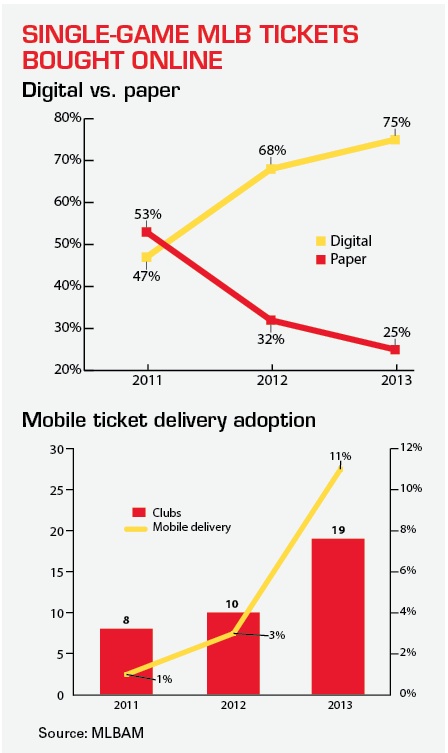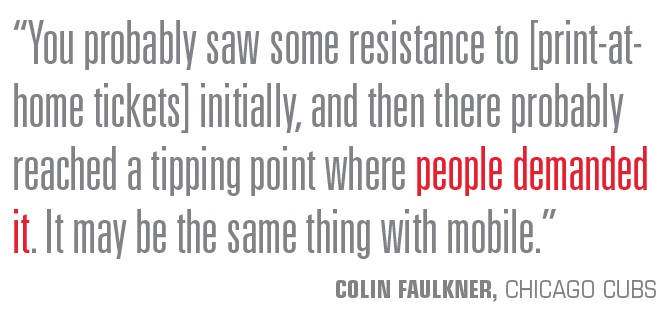By any measure, the Atlanta Braves took a big risk this season by essentially forcing their season-ticket holders to embrace mobile ticketing.
Mobile ticketing adoption rates across the sports industry are estimated in the low double-digit percentages at best, even after more than a half decade of availability. Industry experts estimate it will be at least several more years before a majority of fans use the technology.
 |
An Atlanta Braves fan has his game ticket scanned at the gate at Turner Field.
Photo by: Atlanta Braves |
Still, the Braves made an aggressive step to turn tomorrow’s future into today’s reality. In February, the club implemented a $250 fee per account to season-ticket holders to get traditional paper tickets, thereby moving from the metaphorical carrot to the stick in terms of promoting mobile ticket adoption.
For a team that’s not been among Major League Baseball’s leaders in attendance since the late 1990s (despite continually competitive teams on the field), the move threatened to disenfranchise its season-ticket base. But club executives felt they simply could not wait any longer for technology trends to catch up to what they wanted to do with mobile ticketing both at Turner Field and at their forthcoming new ballpark in Cobb County, Ga.
“Quite frankly, it seems like the phone is really the future of our business, and the future of commerce in general,” said Derek Schiller, Braves executive vice president of sales and marketing. “This has been a three-year evolution in our case to get to this point, and we’ve been encouraged by the numbers that have been moved to this platform.”
Indeed, the Braves’ early returns place them among the leaders in the industry in moving toward mobile-based ticketing. More than 80 percent of the club’s season-ticket holders accepted the Braves’ FanPass system instead of paper tickets, thereby avoiding the surcharge, more than triple its adoption rate from two years ago for all forms of digital ticketing. Nearly 60 percent of all tickets scanned at Turner Field during the club’s first six home games this season, also including single-game buyers not subject to the potential fee, were either print-at-home vouchers or mobile barcodes.
Still, the Braves and the rest of baseball this season are pushing for even greater returns, trying to further accelerate the rate of adoption for mobile ticketing through a series of new initiatives.
A major update this season to the At The Ballpark mobile application, developed by MLB Advanced Media, will include a pronounced emphasis on ticketing for both single-game buyers and season-ticket holders. Many clubs also are weaving their fan loyalty programs into their mobile ticketing offerings, creating a much more seamless and unified fan experience.
In short order, a fan’s own smartphone is at once his ticket, his access point to complementary information such as in-game video highlights at the stadium and wayfinding, and the storehouse for his personal loyalty data.
“We’ve retooled a lot of the [At the Ballpark] app to make it much more club-centric,” said Bob Bowman, MLBAM president and chief executive. Bowman estimates that baseball’s mobile ticketing will surpass 20 percent of all online-based sales in baseball this season, about twice last year’s figure. “Adoption of the app is definitely a priority this year.”
For the Braves and many other clubs, the attractiveness of mobile ticketing is not hard to understand. Tickets are no longer lost, stolen or physically left in the desk drawer — that last happenstance being for decades the bane of the sports industry. With mobile ticketing, the ability to mine data from fans’ ticket usage and related behaviors is greatly enhanced, thereby fueling future upsells and more customized ticket offers.
There are significant cost savings from reduced printing and postage costs incurred in creating and distributing paper tickets, as well. The Braves alone reduced their ticket printing bill this season by more than $60,000.
“We can learn so much about our fans now,” Schiller said. “This gives us the ability to learn more about what they want and, in turn, it better enables them to access all our offerings here at Turner Field.”
Removing barriers
While there is near-universal agreement within the sports industry on the significant growth potential and utility of mobile ticketing, boosting adoption beyond the 5 percent to 15 percent use rates currently seen by most clubs still requires retooling more than a century of hardwired fan behavior and removing barriers to use.
Furthering the challenge is the current 65 percent penetration rate for smartphones among all U.S. mobile subscribers, according to digital measurement agency comScore. That percentage, while steadily growing, still leaves roughly one-third of mobile users, as well as those without any sort of cellular device, unable to receive a mobile ticket barcode. As a result, many teams, leagues and vendors have been particularly focused of late on easing obstacles, both real and perceived — such as fan insecurity that mobile barcodes are sufficient for entry, security of mobile tickets, and the utility of mobile transfer to enable resale.
A big part of that effort involves communicating to fans, repeatedly, that mobile tickets are indeed genuine and accepted, even if they don’t necessarily have the same commemorative value as paper stubs.
“I think it’s also a matter of distrust for this thing that doesn’t really feel tangible and real,” said Cole Gahagan, Ticketmaster executive vice president. The ticketing giant, through corporate parent Live Nation, has made a significant move toward mobile ticketing (see story). “The more times I walk in and have [the phone] scanned, the more I’m actually going to trust it, regardless of the [demographic].
“There really has not been a distribution channel that clients and teams have gotten really comfortable in making [mobile] the only method of delivery. Venues and teams are marching their way toward that,” Gahagan said.
Colin Faulkner, vice president of sales and partnerships for the Chicago Cubs, compares consumer hesitation over mobile ticketing to the time several years ago when fans could first start printing their own tickets at home.
“You probably saw some resistance to that initially, and then there probably reached a tipping point where people demanded it,” Faulkner said. “It may be the same thing with mobile.”
Enabling easier resale and transfer has been a fundamental part of the ongoing mobile ticketing conversation between teams and season-ticket holders. In baseball’s case, the sport’s official resale partner, StubHub, is now directly integrated into the At Bat and At The Ballpark mobile apps (see story).
“We think having the mobile ticket actually makes it more likely and easier to transfer and really helps with security
because the phone is the one thing people have with them all the time,” Bowman said.
Sports will be taking additional mobile ticketing cues from the aviation industry, which has been particularly aggressive in this area in recent years and serviced more than 643 million U.S. passengers in 2013, according to the U.S. Department of Transportation, more than four times the combined attendance of MLB, the NFL, NHL and NBA.
“Other industries are helping make this the norm and that the phone is something you can trust,” said Blake Sirach, vice president of design for WillowTree Apps, a Virginia-based firm that helped build the mobile ticketing app for AXS Ticketing, AEG’s ticket division. “The airlines are really pushing this, and every time you go to the airport, you see more and more people using their phone. There’s no question that’s going to filter to sports and help get people more comfortable.”
Carrot or stick?
About six weeks after the Braves announced their $250 surcharge for printing paper season tickets, the club made another big ticketing announcement. The Braves deepened their relationship with fellow Atlanta company Experience — already a partner of MLBAM, more than half of MLB’s individual clubs, Ticketmaster and the NFL — to offer Braves season-ticket holders guaranteed seat upgrades and discounted upgrades to advance single-game purchasers.
Mobile is a fundamental component of the Experience offering, as users receive in-game alerts on their devices about available seat upgrades and other amenities. The Braves’ rollout relies on advanced computations that instantly make fans’ old seats open to other users when they upgrade themselves.
In a sense, the guaranteed seat upgrades for Braves season-ticket holders were the sugar that perhaps went with the salt when moving to FanPass. But put together, the club now offers a unified, mobile-based fan experience at Turner Field.
“The situation for every game changes; the kind of upgrades that are going to be available day to day are going to be different based on a variety of demand factors,” said Experience founder and chairman Tripp Rackley. “The critical component of the system is really flexibility and the ability to adjust the factors that matter, both from the team-facing side and the fan-facing side.”
The upgrade offers also provide a key operational benefit to the Braves. By promoting additional advance single-game sales through the upgrade coupons, the club seeks to reduce its walk-up ticket sales, a variable that complicates the team’s ability to staff elements such as security and concessions appropriately.
Other clubs are developing various amenities and offers to help nudge fans toward mobile adoption, as well. The Kansas City Royals are offering a $50 gift card to season-ticket holders as an incentive for mobile use, redeemable for additional tickets, merchandise, concessions and other purchases at Kauffman Stadium. The team recently rolled out a new Royals Memories program through the At The Ballpark app that offers upgraded experiences such as postgame catches and photos on the field at Kauffman. The Tampa Bay Rays are offering $50 discounts on season-ticket invoices for every seat enrolled in their radio frequency identification (RFID)-based ticket system that will soon have a mobile component. Still other clubs, including the Chicago Cubs, are boosting loyalty club rewards and offering merchandise and concession discounts as enticements for fans to embrace mobile ticketing.
In nearly every case, fans have been a fundamental part of the creation of the programs, often through focus groups and pilot programs, as season-ticket sales remain the lifeblood of a baseball team’s operations. Even with the recent historic runup in local MLB media rights fees, tickets are still a critical source of revenue for clubs.
“Through mobile ticketing, we know more about our customers so that we can anticipate their needs and customize experiences based on their preferences,” said the Cubs’ Faulkner. “I think fans in this day and age want that. This allows us to have more data on what they like and don’t like and helps us do that.”
Still, many MLB clubs are wondering if enticements, rewards and focus groups are sufficient tools to spur mobile adoption. The Braves’ recent, more punitive moves are being closely watched and are being perceived as important stimuli to move mobile ticketing to a much broader and more impactful phase.
“I don’t think incentives are really enough,” said Mike Bucek, Royals vice president of marketing and business development. The Royals currently have fewer than 5 percent of their season-ticket base on a mobile delivery system and are still in what the team calls an “experimental” phase with the technology. “Right now, where things are and are going, I’m happy, and we’re also going to have experiential things folded into the app,” he said.
“There’s no doubt this is the wave of the future, but when you look at what the Braves did, it sort of makes you rethink.”
Ticketing approaches among Major League Baseball teams
What teams are doing this season to encourage season-ticket holders to convert to mobile tickets (or to penalize those who still prefer paper):
■ Atlanta Braves: Charge a $250 fee for season-ticket holders who elect to use paper tickets.
■ Boston Red Sox: Offer triple “Red Sox Rewards” points for season-ticket holders who enter the park via mobile, redeemable toward various team items or experiences.
■ Cleveland Indians: Season-ticket holders who elect digital delivery receive on average a 10 percent discount (depending on plan level) versus traditional paper ticket prices.
■ New York Mets: Charge a printing fee of $25 per account for the “fancy” season-ticket paper stock, which includes a messenger bag.
■ Tampa Bay Rays: During the renewal process, offered a $50 discount for each seat in the plan in which fans opted for digital-only ticketing. Flex Packs are digital-only plans, sold as three-, six-, or nine-game packages.
■ Washington Nationals: Required season-ticket holders to move to a virtual ticketing program if they wanted to receive loyalty points and all the benefits of the loyalty program. The team had a 100 percent conversion rate. All season-ticket holders received a commemorative Opening Day ticket. For those looking for a paper ticket, the team sells game-specific commemorative tickets in the ballpark.
More than half of all MLB clubs have teamed up with Experience, an app that allows fans at games to upgrade their seats or buy a fan experience. Also, approximately half of the league’s clubs are aligned with MLB subsidiary Tickets.com. Within MLB.com’s At The Ballpark free app, Tickets.com’s MyTickets Mobile portal allows fans to retrieve their tickets on a mobile device and contains a bar code for each ticket purchased. Fans also can add their tickets to Apple Passbook on compatible iOS devices, if they buy a ticket from one of the approximately 20 clubs that have enabled the Passbook app. Additionally, about two-thirds of the league’s teams have installed, or plan to install, Apple’s iBeacon technology, which allows fans to go to the ballpark without a paper ticket or cash, and provides customized experiential information. Here are details of upgrades MLB clubs have made to enhance their fans’ mobile ticketing experience:
■ Arizona Diamondbacks: Ticketmaster installed new scanners at all gates.
 |
Ticketmaster installed new scanners at all gates at Arizona’s Chase Field.
Photo by: Getty Images |
■ Boston Red Sox: Access control technology and turnstiles provided by Kaba with the readers made by Fortress, in partnership with Tickets.com and MLBAM.
■ Chicago White Sox: Selected Avnet Services to build a data warehouse and develop the corresponding business intelligence tools.
■ Colorado Rockies: Concessionaire Aramark and the team upgraded all scanners and point-of-sale stations so that mobile tickets preloaded with concession credit can be used anywhere in the stadium where a credit card is accepted.
■ Los Angeles Dodgers: All new turnstiles and scanners.
■ Milwaukee Brewers: Alvarado, a provider of access control systems, worked with Tickets.com and MLBAM to complete the final phase of a three-year upgrade making Miller Park 100 percent digitally compatible at all entry points.
■ Oakland Athletics: Upgraded concessions to read 2-D mobile bar codes; added access points to parking so fans can prebuy parking and forward and resell their inventory through At the Ballpark. Concessionaire Ovations purchased Motorola 2-D scanners for reading mobile barcodes.
■ San Diego Padres: Fortress installed new turnstiles with RFID/mobile bar-code readers at every gate, along with RFID/mobile bar-code readers at every point-of-sale in the ballpark.
■ Seattle Mariners: Concessionaire Centerplate installed scanners at the vendor registers to read the 2-D bar codes on mobile tickets.
■ Tampa Bay Rays: Fully integrated Ticketmaster, Centerplate (concessionaire), Quest (point-of-sale system), and Central Parking into the Rays Rewards Card.
■ Texas Rangers: Added the ability to read enhanced/QR bar codes; added My Tickets Mobile, through Tickets.com.
■ Washington Nationals: Finished installing Kaba turnstiles, with the scanners made by Fortress, at every gate.








